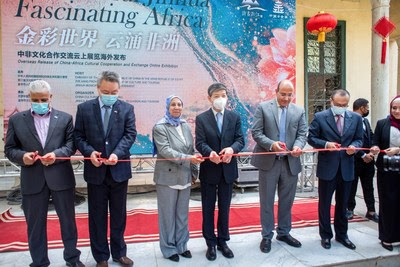LE CAIRE, 19 novembre 2022 /PRNewswire/ — Le 17 novembre 2022, l’exposition en ligne sur la coopération et les échanges culturels entre la Chine et l’Afrique « Wonderful Jinhua, Fascinating Africa », qui est accueillie conjointement par le département provincial de la culture et du tourisme de Zhejiang et le gouvernement populaire municipal de Jinhua, et qui est organisée par le bureau de la culture, de la radio, de la télévision et du tourisme de Jinhua, a été inaugurée au Caire, en Égypte.

L’exposition cloud « Wonderful Jinhua, Fascinating Africa » déploie le panorama de Jinhua, Zhejiang en termes d’histoire, de paysages, d’art, de patrimoine culturel immatériel, de nourriture, etc. Jinhua est la ville mondiale des petits produits et la ville culturelle internationale du cinéma et de la télévision, qui se caractérise par « l’ouverture de la route de la soie ». Jinhua possède les célèbres sculptures en bois de Dongyang, le jambon de Jinhua, le thé du millénaire et le vin de riz, qui ont tous une grande influence mondiale.
M. Chen Guangsheng, secrétaire du parti du département de la culture et du tourisme de la province du Zhejiang, et M. Ruan Ganghui, vice-maire de la ville de Jinhua, ont tous deux prononcé des discours en ligne lors de la cérémonie d’ouverture. Ils espèrent que, grâce à l’exposition cloud, le Zhejiang pourra exploiter pleinement ses avantages en matière de coopération et d’échanges culturels avec l’Afrique, renforcer la réputation internationale de Jinhua et promouvoir le réchauffement continu des échanges culturels entre la Chine et l’Afrique.
Mr. Liao Liqiang , S.E. l’ambassadeur de l’Ambassade de Chine en Égypte, déclare que l’Égypte est le modèle des relations durables, saines et profondes entre la Chine et l’Afrique dans la nouvelle ère. L’amitié entre l’Égypte et la Chine est souhaitée par tous.
Fathi Abdel-Wahab, ancien président du Fonds de développement culturel d’Égypte, affirme que l’exposition en ligne contribuera à promouvoir l’amitié Chine-Afrique L’Égypte mettra tout en œuvre pour construire et maintenir les « échanges culturels et touristiques », qui constituent le pont de l’amitié sino-africaine.
Dans son discours, M. Amr El-Kady a déclaré que l’amitié Afrique-Chine est profonde. Il est très heureux de voir que l’exposition en ligne a trouvé un nouveau moyen d’échanges culturels et touristiques entre l’Afrique et la Chine, facilitant ainsi les contacts et les échanges entre les deux parties.

Lorsque la cérémonie d’ouverture aura lieu en Égypte, l’exposition en ligne « Wonderful Jinhua, Fascinating Africa » sera lancée en ligne simultanément en Tanzanie, au Zimbabwe, à Maurice, à Djibouti, en Éthiopie et dans d’autres pays africains. Les Africains peuvent profiter des beaux paysages et des coutumes culturelles de la ville de Jinhua, dans la province du Zhejiang en Chine, grâce à l’internet, et améliorer leur compréhension et leur connaissance de la ville de Jinhua, de la province du Zhejiang et même de la Chine.
Lien vers l’exposition en ligne « Wonderful Jinhua, Fascinating Africa » (en anglais)
http://online-exhibition.
Photo : https://mma.prnewswire.com/
Photo : https://mma.prnewswire.com/
